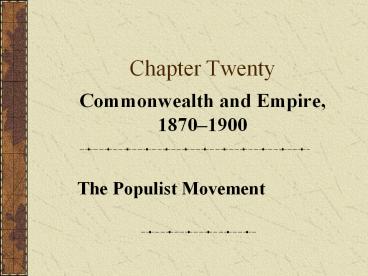Chapter Twenty PowerPoint PPT Presentation
1 / 13
Title: Chapter Twenty
1
Chapter Twenty
- Commonwealth and Empire, 18701900
The Populist Movement
2
The Grange
- The Grange, form of farmers union in 1870s in
Great Plains and South, who suffered from boom
and bust conditions. - Grangers blamed hard times on a band of thieves
in the night. - Mostly Railroads who pushed through laws
regulating shipping rates and other farm costs.
3
(No Transcript)
4
The Farmers Alliance
- In the late 1880s, Texas farmers, the National
Farmers Alliance and Industrial Union. The
Alliance sought to - challenge the disproportionate power of the
governing class - restore democracy
- establish a cooperative economic program
5
Populism and the Peoples Party
- Between 1890 and 1892, many organizations formed
the Peoples Party. - The Peoples Party platform called for
- government ownership of railroads, banks, and the
telegraph - the eight-hour day
- the graduated income tax, and other reforms
- Though the party lost the 1892 presidential race,
Populists elected three governors, ten
congressional representatives, and five senators.
6
The Depression of 1893
- In 1893, the collapse of the nations major rail
lines precipitated a major depression. - Full recovery was not achieved until the early
1900s. - Unemployment soared and many suffered great
hardships. - Tens of thousands took to the road in search of
work or food.
7
Labor Strikes Homestead and Pullman
- Strikes were sparked by wage cuts, longer work
days, and big business attempts to destroy
unions. - The hard times precipitated a bloody
confrontation at Andrew Carnegies Homestead
steel plant. - A major strike in Pullman, Illinois
- spread throughout the nations railroad system
- ended with the arrest of Eugene Debs
- resulted in bitter confrontations between federal
troops and workers in Chicago and other cities.
8
In 1894, to protest a cut in wages, the workers
of the Pullman Palace Car Company struck. Eugene
V. Debs, president of the American Railway Union,
ordered a nationwide boycott against the Pullman
Company. The United States Cavalry was brought in
to escort the trains run by scab laborers
9
Populism's Last Campaign
- The hard times strengthened the Populists, who
were silver advocates. - In 1896, when the Democrats nominated William
Jennings Bryan as a champion of free silver,
Populists decided to run a fusion ticket of Bryan
and Tom Watson. - Republicans ran William McKinley as a safe
alternative to Bryan. - Republicans characterized Bryan as a dangerous
man who would cost voters their jobs.
10
(No Transcript)
11
This Republican campaign poster of 1896 depicts
William McKinley standing on sound money and
promising a revival of prosperity. The depression
of the 1890s shifted the electorate into the
Republican column.
12
The Election of 1896
- William Jennings Bryan won over 46 of the vote
but failed to carry the Midwest, Far West, and
Upper South. - Traditional Democratic groups like Catholics were
uncomfortable with Bryan and voted Republican. - The Populists disappeared and the Democrats
became a minority party. - McKinley promoted a mixture of pro-business and
expansionist foreign policies. - The return to prosperity after 1898 insured
continued Republican control.
13
(No Transcript)

